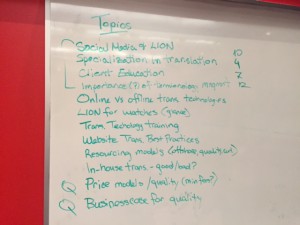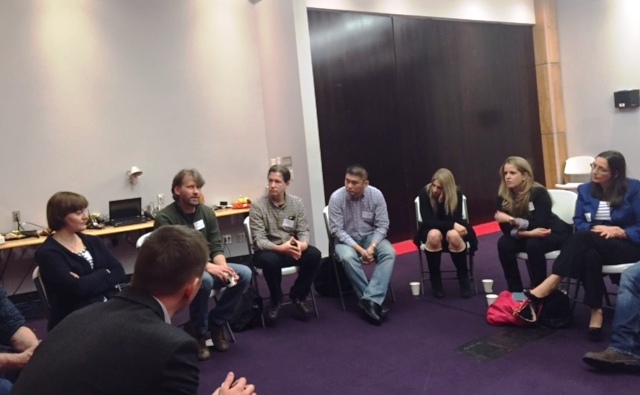
Another of the many reasons that contributed to our big move from Greece to Canada: being close to brilliant translation and localization events! The most recent event I attended was the Localization Unconference in Toronto on April 23. Unconferences are a relatively new trend so you probably don’t know what’s involved. Well, it’s completely different than any other professional event and conference, translation-related or otherwise.
The unconference format is designed to facilitate a spontaneous, free-flowing exchange of ideas. There are no exhibitors (i.e. no sales pitches), no set schedule or presentations, no boring topics. The unconference is free (so make sure to thank the very nice organizers who bring the coffee, breakfast & lunch). The attendees gather in a room and everyone has a few minutes to introduce themselves. Then, the brainstorming begins to determine the topics for discussion. Everything is on the table apart from talking about specific rates. The proposed topics are written on a whiteboard and then the attendees vote on what should be discussed first.
That’s it! Pretty simple process, huh? Then, the fun begins. Great conversations with people from all kinds of different backgrounds (but all of them have localization in common) who share their experiences and tips on every topic.
The Localization Unconference in Toronto was organized by Jenny Reid, Localization Project Manager, BlackBerry; Oleksandr Pysaryuk, Localization Manager, Achievers; and Richard Sikes, Principal Consultant, Localization Flow Technologies.
The event took place in the gorgeous offices of Achievers and we also got to meet the CTO, Aris Zakinthinos, who told us how he got to appreciate the importance of translation with the help of Oleksandr Pysaryuk.
Special thanks to Lara Daly and Moravia for helping with the email communication for the event and for sponsoring the excellent dinner for all the attendees at Mildred’s Temple Kitchen.
What we talked about

The trending: social media (benefits, how to use them), specialization for translation companies (better to offer all languages and fields than specialize in a few for better focus on markets, better cooperation with providers), online vs offline translation technologies, app localization for wearables (huge potential), machine translation (it wasn’t one of the original topics, but of it came up at some point).
Excited to attend a future localization conference near you? Check out the upcoming events.
You can also read about the 2014 Localization Unconference in Toronto.








